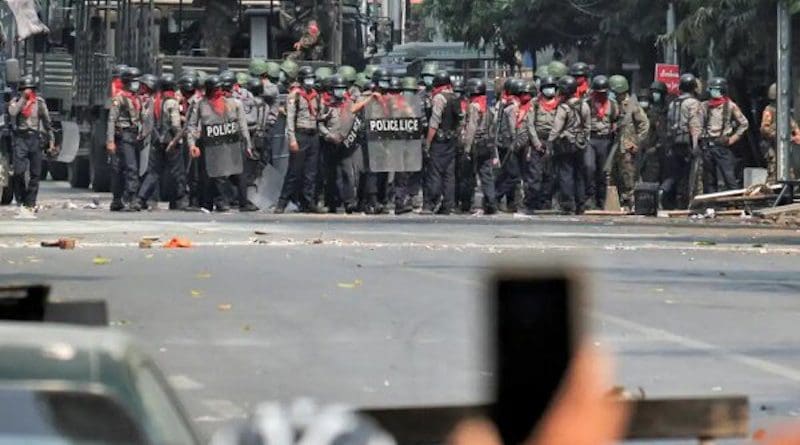Nicholas Kong

As the resistance forces gain momentum in the Spring Revolution, the Myanmar military, disparagingly known as the Sit-Tat, finds itself increasingly on the defensive. Amidst this backdrop, the State Administration Council (SAC) announced on February 10, 2024, the enforcement of the 2010 Conscription Law, a move widely perceived as another ill-judged attempt by General Min Aung Hlaing to drag the entire nation down with him.
The People’s Military Service Law, enacted by the State Peace and Development Council—the precursor to the SAC—and signed into law by General Than Shwe on November 4, 2010, mandates service in the armed forces for all men aged 18 to 35 (extending to 45 for those with professional expertise) and women aged 18 to 27 (extending to 35 for those with professional expertise) for a period of two years, which can be extended to five years during national emergencies. Failure to comply with conscription can result in imprisonment for up to five years, a fine, or both.1,2
The question arises: why resurrect this 14-year-old law now? The apprehensive coup leader highlighted the law at the Veterans Convention on November 22, 2021, and again at the SAC’s annual meeting on February 2, 2022.3,4
According to Ye Myo Hein, a visiting Fellow at the United States Institute of Peace, the Sit-Tat had approximately 150,000 members, including around 70,000 combatants, as of May 2023.5 However, there has been a significant decrease in morale and numbers among the military due to a series of defeats inflicted by the coordinated democratic forces across Myanmar as well as an increase in casualties, desertions, defections, and detentions as prisoners of war since Operation 1027 in October 2023.6,7In addition to colossal losses on the battlefields, the junta has also experienced severe setbacks on the economic front due to Western sanctions.
In a desperate bid to replenish his depleted forces, General Min Aung Hlaing attempted two unsuccessful measures. On November 14, 2023, the members of the University Training Corps were ordered to report their biodata to the Directorate of People Militia and Border Guard Forces. On December 21, 2023, 645 deserters were released from prisons under a decree with the stipulation that they re-enlist.9
After these two attempts failed, the “Commander-in-Mischief” opted for what many see as a last-ditch effort: the enforcement of Conscription Law on February 10, 2024, followed by the activation of Reserved Military Force Law on February 13, 2024.10 The latter mandates veterans to serve in the reserved force for five years post-retirement.
The repercussions of the Conscription Law have far-reaching consequences, affecting not only the people and the junta but also the revolution and neighboring countries. The plan to draft 60,000 young men and women starting in mid-April has already triggered widespread panic, prompting a mass exodus of the youth. Families of the 13 million youth in Myanmar are feeling the acute impact, compounded by economic hardships, shortages of essential goods, soaring prices, and inflation. The private sector is further burdened, being compelled to continue paying salaries for drafted employees.
This law will essentially sanction a longstanding abusive practice of coerced military service, which has been both ad hoc and illegal. The generals may hope to replace experienced troops with these inexperienced recruits, using them primarily as cannon fodder. However, forced enslavement runs the risk of these reluctant conscripts turning their weapons against their own ranks or becoming informants. Morale is expected to plummet further as troops witness their relatives being forcibly conscripted, potentially driving more individuals to join the armed resistance.
In response, the National Unity Government (NUG) issued a statement on February 13, 2024, stating that “the NUG of Myanmar, in collaboration with allied organizations will take all necessary measures to prevent the junta’s attempted roll out of forced conscription and will address dangers faced by the public.”8 This reflects a strategic and thoughtful approach by the NUG and Ethnic Revolutionary Organizations (EROs) to avoid the pitfalls of the junta’s scheme, which would result in the displacement of young individuals—a scenario that would pose immense challenges in terms of accommodation, basic needs, and security.
In the words of Sun Tzu, “Know thyself and know thy enemy,” and “Who wishes to fight must first count the cost. Don’t let sacrifices sneak up on you. Whatever path you take, know the consequences.” The revolutionary leaders are thus urged to remain vigilant, not allowing the junta’s actions to distract from the broader goals of the revolution.
The international community, and particularly neighboring countries, must brace for a massive humanitarian crisis due to significant influx of migrants, including a surge in unregulated and hazardous labor migration, on top of the existing refugee crisis and cross-border instability. This situation underscores the role of the Myanmar military as the primary source of chaos within country and a key contributor to regional instability.
Despite the turmoil, there lies an opportunity to dismantle the military dictatorship. The people of Myanmar are called upon to deepen their engagement in the Spring Revolution and to support the revolutionary forces with prudence, patience, and perseverance. The revolution must ensure that conscription becomes a constriction not for the people’s movement but for the military dictators themselves.
No comments:
Post a Comment